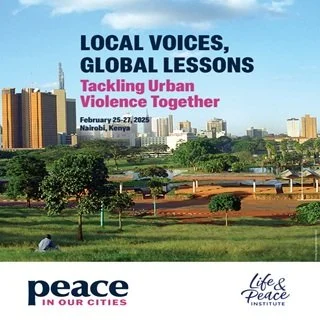By Peace in Our Cities
From February 25 to 27, Peace in Our Cities (PiOC) members and experts, particularly from the African continent, met in Nairobi, Kenya, for the first Regional Workshop of the PiOC network, organized in partnership with the Life & Peace Institute (LPI). This regionally-focused workshop brought together PiOC member cities and representatives for knowledge exchange and experiential learning on topics such as gender-based violence, youth, data and technology, climate change, and organized criminal violence in the unique context of Africa’s rapid urbanization and social change. The three-day workshop included discussions, training sessions, and site visits to informal settlements of Nairobi, all to explore community-specific violence prevention strategies on the most pressing topics related to urban violence in the region. Cross-cutting insights across workshop elements included: – Violence as a complex phenomenon: Participants emphasized that violence is a multi-pronged and interconnected crisis, involving issues related to governance, gender, inequality, housing, climate change, unemployment, political participation, and more. – Prevention over suppression: Participants agreed that it is not enough to take action to stop violence as it happens, but that governments and other stakeholders need to identify and address the root causes of violence through holistic and whole-ofsociety approaches. – The need to build trust between the community and law enforcement: Participants expressed the importance of creating bridges between the community and the police. Although policing cannot be seen as the sole solution to violence prevention, it is crucial that community members can see law enforcement as reliable, safe, and responsive. – Young people as agents of change: Throughout the discussions, participants remarked that young people feel alienated from political conversations and decision-making, highlighting the need to elevate young people’s voices in discussions related to violence prevention. – Data as a tool for violence prevention: Participants highlighted the importance of using data to understand the violence that affects their communities and design more effective and bettertargeted violence prevention strategies, while expressing their concerns surrounding resource constraints. – Responding to challenges with better institutions and effective governance: Participants remarked on the need to build institutions and governance practices that can answer emerging global challenges such as organized crime, changes in the international funding landscape, and climate-related threats. – Networking and strategic partnerships: different sessions throughout the workshop brought to the fore the importance of coalition building between civil society actors and partnerships with key state actors to bridge the gap between policy and practice and ensure long-term sustainability of efforts to address urban violence. The workshop provided an opportunity for PiOC members to share their approaches and explore critical linkages for continued engagement
Peace in Our Cities, 2025. 14p.



